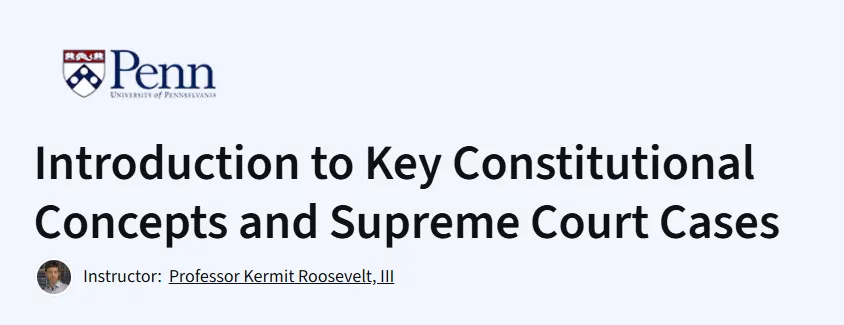What will you learn in Introduction to Key Constitutional Concepts and Supreme Court Cases Course
Core principles behind the U.S. Constitution and their philosophical origins.
How constitutional structures protect liberty through limited government.
The meaning and importance of separation of powers and federalism.
Key constitutional debates, including judicial review and modern interpretations.
Program Overview
Module 1: Introduction to the Constitution
⏱️ 1 week
Topics: Declaration of Independence, natural rights, purpose of government.
Hands-on: Analyze Jefferson’s principles in relation to constitutional foundations.
Module 2: The Structure of the Constitution
⏱️ 1 week
Topics: Articles I–III, checks and balances, republicanism.
Hands-on: Compare structural safeguards to modern governance.
Module 3: Federalism
⏱️ 1 week
Topics: Division of power, enumerated powers, 10th Amendment.
Hands-on: Case studies on state vs. federal authority.
Module 4: The Judiciary
⏱️ 1 week
Topics: Article III, judicial review, role of courts.
Hands-on: Examine the implications of Marbury v. Madison.
Module 5: The Bill of Rights
⏱️ 1 week
Topics: First Ten Amendments, civil liberties, incorporation doctrine.
Hands-on: Interpret real-world conflicts using constitutional protections.
Module 6: The Progressive Challenge
⏱️ 1 week
Topics: Modern reinterpretations, living Constitution, administrative state.
Hands-on: Critically reflect on constitutional evolution in the 20th century.
Get certificate
Job Outlook
Beneficial for educators, civil service aspirants, legal assistants, and public policy students.
Equips learners with foundational constitutional literacy—valuable in law, politics, journalism, and government sectors.
Enhances understanding for those entering fields like teaching, public administration, or advocacy.
Specification: Introduction to Key Constitutional Concepts and Supreme Court Cases
|
FAQs
- No prior legal experience required.
- Covers U.S. Constitution principles and philosophical origins.
- Suitable for students, educators, and civics enthusiasts.
- Focuses on practical understanding of constitutional governance.
- Includes hands-on case studies for applied learning.
- Detailed coverage of Articles I–III of the Constitution.
- Explains the roles of legislative, executive, and judicial branches.
- Explores federal vs. state authority and enumerated powers.
- Hands-on exercises compare structural safeguards to modern governance.
- Prepares learners to analyze government decision-making critically.
- Explains judicial review and the role of courts.
- Case study analysis of landmark decisions.
- Highlights the impact of rulings on civil liberties.
- Connects historical cases to modern legal debates.
- Builds skills to interpret constitutional law in real-world contexts.
- Valuable for legal assistants, public policy students, and educators.
- Enhances understanding of civil liberties and governance.
- Supports careers in journalism, government, advocacy, and civic education.
- Provides a strong foundation for advanced legal studies.
- Certificate demonstrates knowledge of key constitutional concepts.
- 6 modules: Introduction, Structure, Federalism, Judiciary, Bill of Rights, Progressive Challenge.
- Each module: ~1 week at a moderate pace.
- Self-paced with lifetime access.
- Includes hands-on exercises in every module.
- Total duration: ~6 weeks.





